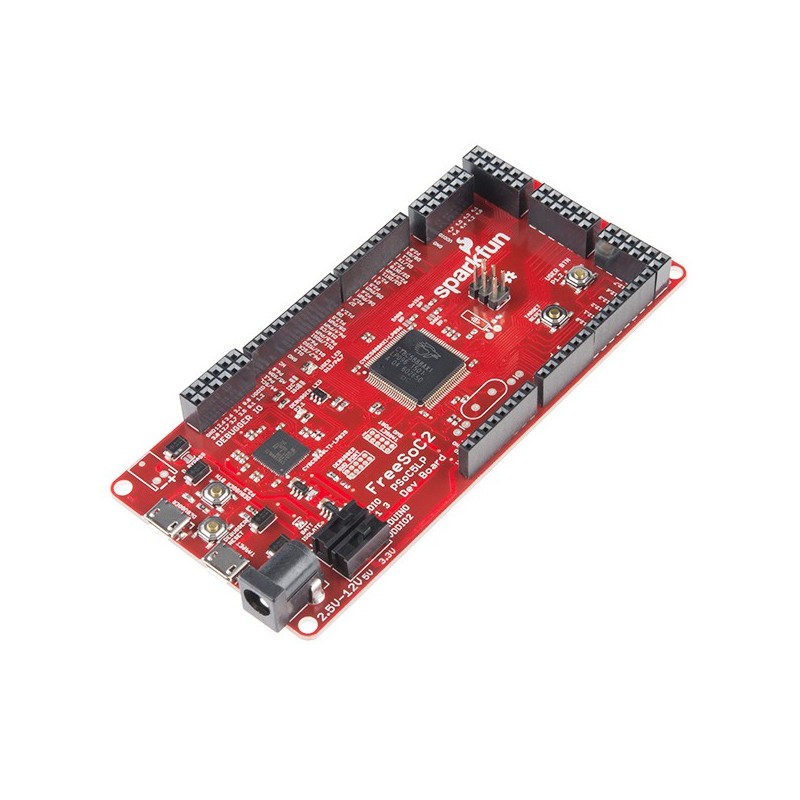- Obecnie brak na stanie






Oparta na układach PSoC5LP (ARM Cortex-M3) CY8C5868LTI-LP039 oraz CY8C5888AXI-LP096 z pamiecią Flash 256 kB, 64 kB SRAM i 2 kB EEPROM. Programowanie w standardowym IDE Arduino oraz możliwość korzystania z tych samych przykładów, bibliotek oraz shieldów co Arduino Uno. DEV-13229
FreeSoC2 Development Board - PSoC5LP
Description:
This is the FreeSoC2 Development Board, SparkFun’s take on the PSoC5LP ARM Cortex. The PSoC (Programmable System on a Chip) brings together features of the programmable devices and microcontroller-type systems on chips into one package. By placing a programmable fabric between the peripherals and the pins, the FreeSoC2 allows any function to be routed to any pin! Moreover, the on-board PSoC includes a number of programmable blocks which allow the user to define arbitrary digital and analog circuits for their specific application.
SparkFun’s FreeSoC2 board has two processors on-board: a CY8C5868LTI-LP039 and a CY8C5888AXI-LP096. The former serves as a debugger/programmer for the latter, which is the target upon which your application code will be installed. Both parts contain a Cortex-M3 processor core, 256kB of flash memory, 64kB of SRAM, and 2kB of EEPROM. The only significant difference between the two are package size and clock speed. The target is in a TQFP-100 package which provides 72 IO pins versus the debugger’s QFN-68 package and 48 IO pins, and the target can operate at 80MHz versus the debugger’s 67MHz limit. Additionally, the FreeSoC2 can support 5V and 3.3V IO voltages.
With a simple upload of new firmware, the Arduino core has been ported to the PSoC5LP, so you can write code for the board in the standard Arduino IDE. The board duplicates the functionality of an Arduino Uno R3’s various hardware peripherals on the pins, so many examples, libraries, and shields will work on this board. However, to get the most out of the device, you will need to use the PSoC Creator IDE (which is free of charge with no code limits from Cypress Semiconductor). Please keep in mind that the PSoC Creator software is Windows-only at this time.
Note: The FreeSoC2 Develpment Board is a collaboration with Jon Moeller. A portion of each sales goes back to him for product support and continued development.
Features:
Documents:
Producent BTC Korporacja sp. z o. o. Lwowska 5 05-120 Legionowo Polska sprzedaz@kamami.pl 22 767 36 20
Osoba odpowiedzialna BTC Korporacja sp. z o. o. Lwowska 5 05-120 Legionowo Polska sprzedaz@kamami.pl 22 767 36 20
HK Turnigy nano-tech 850mah 3S 25~40C Lipo Pack (11899)
Brak towaru
Pakiet Li-Pol o pojemności 2200 mAh, napięcie 22,2 V (6S) z wtykiem XT60. Prąd rozładowania 25C (ciągły), wymiary: 119 x 35 x 46 mm, waga: 353 g. N2200.6S.25
Brak towaru
HK Turnigy nano-tech 4500mah 3S 25~50C Lipo Pack (11931)
Brak towaru
Pakiet Li-Pol o pojemności 5000 mAh, napięcie 7.4 V (2S), wymiary: 173 x 49 x 16 mm, waga: 279 g. N5000.2S.25
Brak towaru
HK Turnigy nano-tech 2200mah 3S 35~70C Lipo Pack (11944)
Brak towaru
HK Turnigy nano-tech 2200mah 3S 45~90C Lipo Pack (11951)
Brak towaru
Konektory zasilania Deans-T, 10 par (20 szt.) (HK11961)
Brak towaru
Brak towaru
HK TURNIGY TRUST 70A SBEC Brushless Speed Controller (12189)
Brak towaru
Brak towaru
Brak towaru
Brak towaru
Brak towaru
Silnik bezszczotkowy Turnigy D2836/11 750 kV typu Outdoor (HK12922)
Brak towaru
Brak towaru
Embest RIoTboard to niewielki komputer z procesorem Freescale\'s i.MX 6Solo bazującym na ARM Cortex™-A9. Posiada 2 x 512 MB pamięci RAM (DDR3 SDRAM) , 4 GB pamięci Flash eMMC.
Dostępny do wyczerpania magazynu!
Brak towaru

Oparta na układach PSoC5LP (ARM Cortex-M3) CY8C5868LTI-LP039 oraz CY8C5888AXI-LP096 z pamiecią Flash 256 kB, 64 kB SRAM i 2 kB EEPROM. Programowanie w standardowym IDE Arduino oraz możliwość korzystania z tych samych przykładów, bibliotek oraz shieldów co Arduino Uno. DEV-13229
